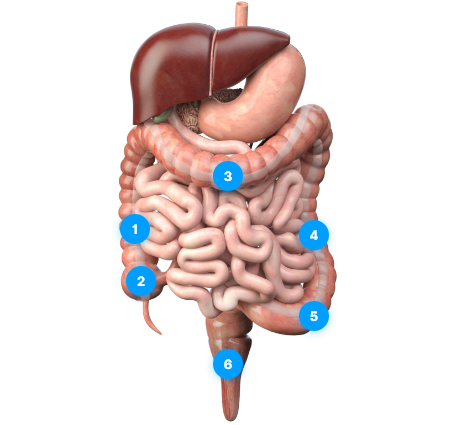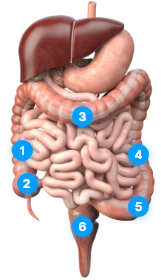Anatomy and function of the colon and rectum
The colon is the intraabdominal portion of the large intestine. It is generally divided into five parts: the cecum, ascending colon, transverse colon, descending colon and sigmoid colon. The rectum is the last 15cm of the large intestine down to the anal sphincter muscles. The colon and rectum function to absorb fluids and electrolytes and to store and eliminate waste.
What is colorectal cancer?
There are multiple types of tumors that arise from the colon and rectum. The term “colorectal cancer” refers to the most common type called adenocarcinoma which arises from the internal lining of the large intestine. These growths generally start as small benign polyps which, if not removed, grow over the course of months to years into cancerous masses. Colorectal cancer affects men and women equally and tend to be more common in individuals older than 50 years old. More recently, colorectal cancer has become more common in younger individuals.


The colon includes:
-
1
The ascending colon
-
2
Cecum
-
3
Transverse colon
-
4
Descending colon
-
5
Sigmoid colon
-
6
Rectum
What puts you at higher risk for colon and rectal cancer?
There are certain risk factors and behaviors that increase the risk of been diagnosed with colon cancer. These are generally divided into major and minor risk factors.
Major risk factors:

Personal or family history of colorectal cancer especially in 1st degree relatives

Hereditary/genetic colorectal cancer syndromes

Inflammatory bowel disease (ulcerative colitis/Crohn’s disease)
Other risk factors:
Obesity
Smoking
High fat diet & processed meats
Diabetes
Ethnic & Racial Background


What are the symptoms of colorectal cancer and how is it diagnosed?
Although colorectal cancer is often asymptomatic, the most common symptoms are bleeding from the rectum and changes in bowel habits such as constipation and thinning of stools. Colorectal cancer is usually diagnosed with colonoscopy and biopsy either once symptoms are discovered or during screening tests. Routine screening for colorectal cancer should be started no later than 50 years of age in individuals at average risk, and should include a combination of stool blood tests and colonoscopy. More recent research suggests that starting screening at 45 years of age may be appropriate. If you have risk factors, screening may need to start sooner.
How is colorectal cancer treated?
Surgery is the most important part of the curative treatment of both colon and rectal cancer. The goal of surgery is to remove the segment of large intestine that contains the cancer and the adjacent lymph nodes. Surgery can be done using traditional incisions or minimally invasively using laparoscopic or robotic techniques. Chemotherapy may be needed to improve the chances for cure in certain colon cancers. With rectal cancer, chemotherapy and radiation are often given before surgery.
What is the Academic Surgical Associates difference?
We are nationally recognized experts in the treatment of colon and rectal cancer. We have performed and published extensive research in the field and have innovated several techniques included transanal rectal cancer surgery. Although most surgeons will offer minimally invasive surgery, not all minimally invasive operations are the same. We are one of the few centers in the country that perform totally intracorporeal laparoscopic and robotic surgery, which means the entire operation is performed with minimal invasion, not just the initial part. This type of surgery offers superior short-term and long-term outcomes. Want to know the difference? Ask us during your consultation.
Connect With Us